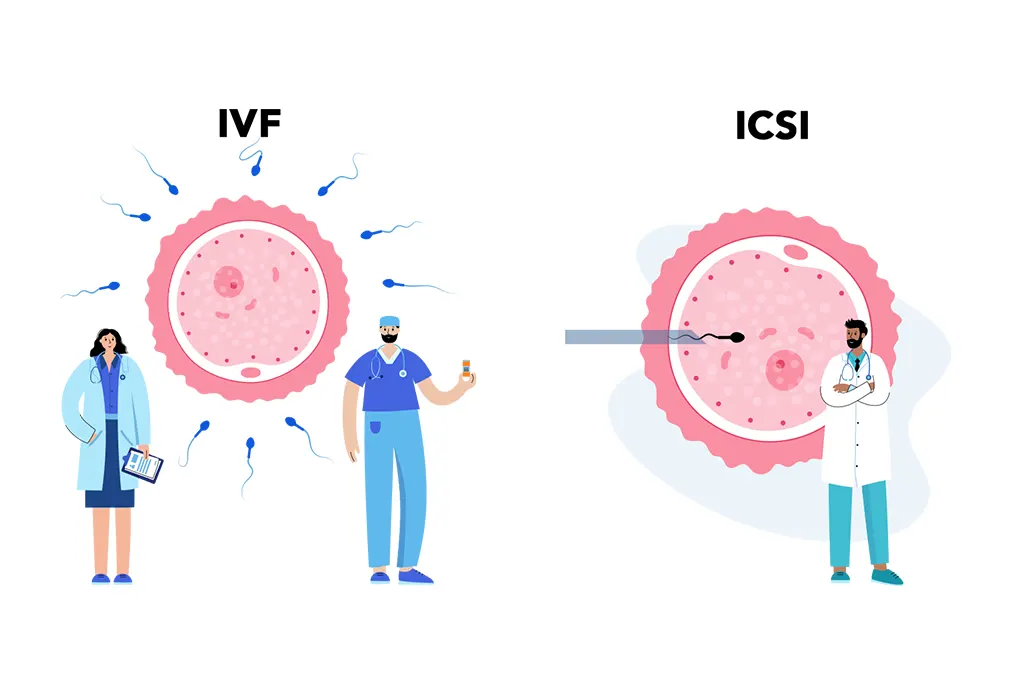What Does IVF Mean?
Assisted reproductive technology (ART) like IVF, or In Vitro Fertilisation, is when sperm are put into eggs that have been taken out of the body. In a lab dish, eggs and sperm will be put together so that the sperm can find the eggs and penetrate them naturally. Embryos are usually fertilised overnight, and they will be cared for in an incubator for another three to five days. Doctors will choose the healthiest and most hopeful ones to put back into the womb.
What Does ICSI Mean?
The term “ICSI” refers to a fertility treatment in which a single sperm is injected straight into the middle of an egg. The egg and sperm then join together outside of the body.
Difference Between ICSI and IVF
Listed below are the major differences between ICSI and IVF.
- For ICSI to work, a very small number of sperm are needed. During IVF, more sperm is needed.
- When ICSI is used, a single sperm is put right into the middle of the egg. Sperm and eggs are put in a Petri dish for IVF, though, so they can join together.
- The ICSI method helps the sperm get into the egg, while the sperm should get into the eggs in IVF.
- The ICSI method works best for treating male infertility, while the IVF technique can be used to treat both male and female infertility.
- The ICSI method is used to get better results, and the IVF technique is used when first-line treatments for infertility, like artificial insemination, don’t work.
- ICSI is a more expensive way to get pregnant than IVF.
- The IVF and ICSI methods are both very famous for getting people pregnant and are used a lot to treat infertility.
Benefits of ICSI Treatment
Now that we know what the process is and how it works let’s talk about the pros of ICSI treatment.
A higher fertilisation rate for couples who are having trouble getting pregnant because of male infertility increased the number of high-quality fertilised eggs that could be made from one group of eggs. These eggs could be used by men whose sperm count is very low or who have problems moving their sperm around.
Suitable for men who have blockages that stop them from ejaculating; can help couples who are having trouble getting pregnant for no clear reason; gives couples power over when their baby is born; and can be done with donated sperm and/or eggs.
Benefits of IVF treatment
There are also many perks to traditional IVF treatment, such as:
It has higher rates of fertilisation and implantation than ICSI for couples who are having trouble getting pregnant because of female infertility. It can also help women with endometriosis, ovulation disorders, damaged fallopian tubes, polycystic ovary syndrome, and premature ovarian failure have a baby. It can also help older women with low ovarian reserve get pregnant. It gives couples who can’t figure out their fertility problems control over the timing of the procedure.
Conclusion
In conclusion, both ICSI and IVF are successful ways to help couples who are having trouble getting pregnant, but they are very different in how they work and what they can be used for. IVF mixes eggs and sperm in a lab dish so that fertilisation can happen naturally. ICSI, on the other hand, inserts a single sperm directly into an egg, getting around any problems that might come up with fertilisation. These methods are picked based on the person’s fertility problems. ICSI is usually used for male infertility, while IVF can be used to treat both male and female infertility more easily. People and couples can make better choices about their fertility treatments if they know the differences between ICSI and IVF.

